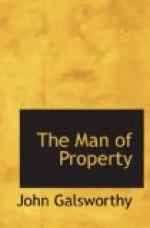Taking the text of Soames’ letters, he lightly touched on ’Boileau v. The Blasted Cement Company, Limited.’ “It is doubtful,” he said, “what that authority has decided; in any case I would submit that it is just as much in my favour as in my friend’s.” He then argued the ‘nice point’ closely. With all due deference he submitted that Mr. Forsyte’s expression nullified itself. His client not being a rich man, the matter was a serious one for him; he was a very talented architect, whose professional reputation was undoubtedly somewhat at stake. He concluded with a perhaps too personal appeal to the Judge, as a lover of the arts, to show himself the protector of artists, from what was occasionally—he said occasionally—the too iron hand of capital. “What,” he said, “will be the position of the artistic professions, if men of property like this Mr. Forsyte refuse, and are allowed to refuse, to carry out the obligations of the commissions which they have given.” He would now call his client, in case he should at the last moment have found himself able to be present.
The name Philip Baynes Bosinney was called three times by the Ushers, and the sound of the calling echoed with strange melancholy throughout the Court and Galleries.
The crying of this name, to which no answer was returned, had upon James a curious effect: it was like calling for your lost dog about the streets. And the creepy feeling that it gave him, of a man missing, grated on his sense of comfort and security-on his cosiness. Though he could not have said why, it made him feel uneasy.
He looked now at the clock—a quarter to three! It would be all over in a quarter of an hour. Where could the young fellow be?
It was only when Mr. Justice Bentham delivered judgment that he got over the turn he had received.
Behind the wooden erection, by which he was fenced from more ordinary mortals, the learned Judge leaned forward. The electric light, just turned on above his head, fell on his face, and mellowed it to an orange hue beneath the snowy crown of his wig; the amplitude of his robes grew before the eye; his whole figure, facing the comparative dusk of the Court, radiated like some majestic and sacred body. He cleared his throat, took a sip of water, broke the nib of a quill against the desk, and, folding his bony hands before him, began.
To James he suddenly loomed much larger than he had ever thought Bentham would loom. It was the majesty of the law; and a person endowed with a nature far less matter-of-fact than that of James might have been excused for failing to pierce this halo, and disinter therefrom the somewhat ordinary Forsyte, who walked and talked in every-day life under the name of Sir Walter Bentham.




